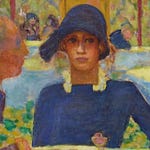RECALLING, NOW, the stories told about the Glynns then, I think I hear, with my adult’s ear, a tone that I’m certain I never noticed as a boy. The tales of the Glynns and their wacky way of life were told with the tone one might use for a story about a particularly dense pet dog. It was, to be technical, ridiculous. What inspired that tone might have been affection rather than contempt, but if it was affection, then it had something in it of the affection one feels for a pet dog, and so I guess I’d have to conclude that there was an underlying contempt whether the tone was affectionate or not.
I came home from school one afternoon not long after my mother had told me that anecdote about the Glynns’ forgetting their car to find her retailing it to several neighboring housewives whom she’d assembled in a coffee-klatsch (quite probably, it occurs to me now, so that she could tell the story about the Glynns). She was just finishing up when I came through the door. The women smiled and nodded their heads as my mother spoke.
I put my books on the kitchen counter and looked in the bread box for a snack. There was nothing but a loaf of bread. However, on a platter on the dining room table, I saw something unfamiliar that I recognized at once: tiny sandwiches on circular pieces of bread. I slipped into the dining room and took two. I sat on the floor in the corner and ate them while I watched my mother perform for her friends.
“So,” she was saying, “finally the party began breaking up. People began leaving in little groups, making their good-byes—”
“I can never get Dick to leave a party,” Mrs. Morton said.
My mother said, “Mm, so just as the last people were leaving—”
“That’s Dick,” said Mrs. Morton. “Always the last to leave.” She rolled her eyes and tapped the arm of her neighbor, Mrs. Freed.
“So,” said my mother, “while they were standing on the porch saying good night to the mayor and his wife—”
“Wait a minute. I’m a little confused. Who was on the porch?” asked Mrs. Vernon. The Vernons were relative newcomers to our block and regarded as glamorous.
“The last people to leave,” said my mother.
“Oh, that would be Dick!” said Mrs. Morton. She laughed and tapped Mrs. Freed again.
“Well, let’s see,” said my mother, knitting her brows. “Oh!” She brightened and went on. “While they were saying good night to the mayor and his wife, along came Mr. and Mrs. Glynn. Walking along—”
“Walking along, arm in arm,” said Mrs. Jerrold, from across the street. She was a tall, slim, pretty woman with smooth black hair. I enjoyed looking at her, but because their house was several houses farther up the street from ours, I couldn’t see into their windows with my binoculars.
My mother smiled and nodded, very briefly, in Mrs. Jerrold’s direction. Mrs. Jerrold nodded back, and my mother went on.
“Everyone stopped talking,” said my mother, spreading her hands out as she said it, in a gesture that even I understood meant that we—her audience—ought to stop talking, too. “The mayor must have wondered what they were doing there—”
“Who?” whispered Mrs. Vernon, in the general direction of Mrs. Jerrold.
“The Glynns,” whispered Mrs. Jerrold.
“He probably thought they’d decided to come back for more champagne!” said my mother. She brought her hands together in a single clap and swept the room with her eyes and smile.
“You remember that they left earlier?” Mrs. Jerrold whispered to Mrs. Vernon.
“No,” whispered Mrs. Vernon, “but never mind. It’s hard to keep people straight when you don’t really know them.”
“So,” said my mother in a louder voice, “Mayor Whitley called out to them, ‘Did you forget something?’”
Very suddenly Mrs. Jerrold said, “And Mr. Glynn said, ‘Yes!’” It might be more accurate to say that she squealed. I felt a sudden panic. Was Mrs. Jerrold going to finish the story? My mother’s eyes were wide, but nonetheless she began to giggle, just as she had at this point in the story when she had told it to me. Everyone else fell silent. My mother was looking at Mrs. Jerrold. For a moment, nothing happened. Then, quite slowly, Mrs. Jerrold turned toward the table, scanned the platter of circular sandwiches, chose one, and took a tiny bite from it.
“‘We forgot our car!’” said my mother, nearly shouting.
We all laughed. In a while the laughter subsided, more quickly than it had when my mother had told the story to my father and me.
[to be continued]
Have you missed an episode or two or several?
You can begin reading at the beginning or you can catch up by visiting the archive or consulting the index to the Topical Guide. The Substack serialization of Little Follies begins here; Herb ’n’ Lorna begins here; Reservations Recommended begins here; Where Do You Stop? begins here; What a Piece of Work I Am begins here; At Home with the Glynns begins here.
You can listen to the episodes on the Personal History podcast. Begin at the beginning or scroll through the episodes to find what you’ve missed. The Substack podcast reading of Little Follies begins here; Herb ’n’ Lorna begins here; Reservations Recommended begins here; Where Do You Stop? begins here; What a Piece of Work I Am begins here; At Home with the Glynns begins here.
You can listen to “My Mother Takes a Tumble” and “Do Clams Bite?” complete and uninterrupted as audiobooks through YouTube.
You can ensure that you never miss a future issue by getting a free subscription. (You can help support the work by choosing a paid subscription instead.)
At Apple Books you can download free eBooks of Little Follies, Herb ’n’ Lorna, Reservations Recommended, and Where Do You Stop? and What a Piece of Work I Am.
You’ll find overviews of the entire work in An Introduction to The Personal History, Adventures, Experiences & Observations of Peter Leroy (a pdf document), The Origin Story (here on substack), Between the Lines (a video, here on Substack), and at Encyclopedia.com.












